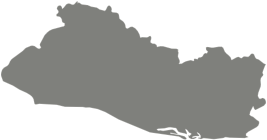Feed the Children began working in El Salvador in 1987 and currently works in 17 communities throughout the country. We strive to go beyond simply providing food, focusing on a more holistic development approach that incorporates community interventions in areas of food and nutrition, health and water, education, and livelihoods.
Feed the Children places great value in education and works to make sure all children are able to enroll, feel safe, and complete a high-quality education. We offer children a healthy meal each school day and provide supplies and backpacks so that they have the resources they need to succeed.
For parents and caregivers, we offer literacy and tutoring classes as well as skills training in areas such as home and community gardening, livestock management, fish farming, baking, and tailoring. These non-formal education and livelihood projects provide an important stepping-stone to becoming self-sustaining communities

The average years of schooling is
6.9 years.
The child mortality rate under 5 years old is 12.9 of every 1,000
Population
6.3 Million
Children with stunted growth
13.6%
Rural population with access to clean water
91%
Prevalence of low birth weight babies
8.7%
Country Profile
El Salvador is known as the Land of Volcanoes; along with frequent and sometimes destructive earthquakes and volcanic activity, it is extremely susceptible to hurricanes. El Salvador has one of the world’s highest homicide rates and pervasive criminal gangs. It is the smallest and most densely populated country in Central America. At least 20% of El Salvador’s population lives abroad. The remittances they send home account for close to 20% of GDP and are the second largest source of external income after exports.
One third of all households receive remittances from family members living abroad. Over a quarter of the population are under the age of 15. El Salvador has a rich agricultural sector producing coffee, sugar, corn, rice, beans, oilseed, cotton, sorghum, beef, and dairy products. However, threats to this production include deforestation, soil erosion, water pollution, and contamination of soils from disposal of toxic wastes.
Support Our Programs
We are excited about the work that is being done in El Salvador to improve the lives of children and their families. We are working to increase access to education as well as promoting healthy behaviors through training on water, sanitation and hygiene. We are working each day to empower families and communities to overcome poverty and become self-sustaining. In El Salvador, we provide opportunities for improved livelihoods through tilapia farming. Feed the Children trains heads-of-households on how to successfully start and maintain tilapia farms and supports the start-up through the provision of tilapia and necessary materials, such as nets and concrete to build the tanks. Additionally, Feed the Children staff provide ongoing support to ensure the success of these small income-generating activities. Would you consider partnering with Feed the Children to continue this important work? Your support enables us to continue implementing livelihoods activities like tilapia farming which allow families to increase their sources of food and income.

